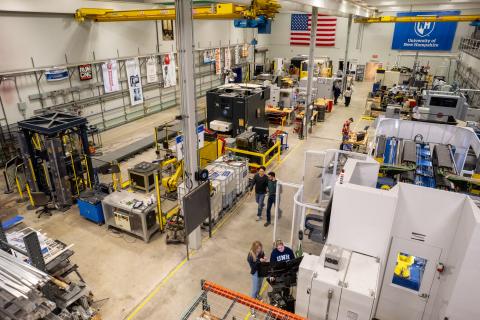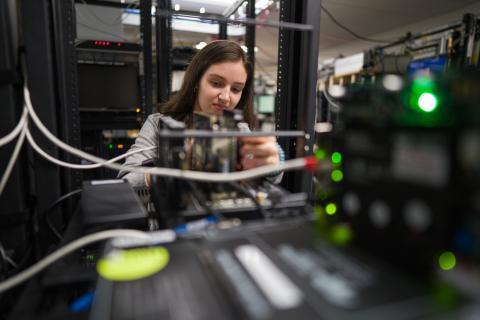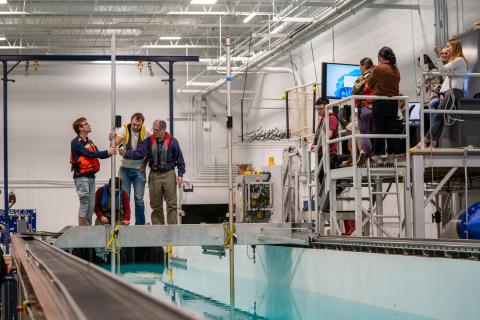UNH Innovation Scholars talk about their experiences in the program.
The World Knows Us. Join Us, and Let Them Get to Know You too!
As an Innovation Scholar, you’ll be in the center of facilities that top organizations in the world turn to when they seek research expertise or to test their products. Like Apple, Dell and other top technology companies that test their data and network product at the UNH InterOperability Laboratory. The John Olson Advanced Manufacturing Center and Jere A. Chase Ocean Engineering Laboratory are two additional world-class facilities that will only add to UNH’s reputation on the global stage – and your opportunity to make an impact on that stage.
What is the Innovation Scholars Program?
Innovation Scholars is a research driven introduction to the university for first-year students. Students will be part of a cohort of students under the direction of a faculty member that guides them through a year-long research experience culminating in a presentation of research results at the Undergraduate Research Conference or equivalent activity. Participants will develop skills that will open doors of opportunity at UNH and more broadly, and experience the interconnectedness of UNH scholarly activity with UNH Innovation and UNH Career and Professional Success.
Who can participate in the Innovation Scholars Program?
Any ambitious CEPS students interested in starting hands-on research in their first semester to supplement the typical first-year curriculum.
What are the research cohorts in the Innovation Scholars Program?
There are currently five research cohorts in the program, listed below.
Research Cohorts
Students will be exposed to state-of-the-art manufacturing topics including Industrial Internet of Things (IIoT), cyber security, data analytics, factory automation/robotics, and environmentally benign manufacturing as well as discrete processes such as 3D printing, machining, forming, electronics fabrication, molecular self-assembly, and casting. For a final project, students will work in teams to innovate and fabricate a final product of their own design using multiple coordinated manufacturing processes, integrated electronics, Computer-Aided Design, Computer-Integrated manufacturing, and metrology. The interplay of academic disciplines in modern manufacturing requires an interdisciplinary group of scientists and engineers.
This section is designed for ambitious students who are passionate about technology to experience software and hardware design and development with a focus on the IOL’s core competency of network technologies . This section will give students a strong foundation in Research Idea Generation and Entrepreneurship by developing the basic skills necessary to develop an idea and deploy an Internet of Things (IoT) system. Students gain hands-on experience working in teams using modern development practices such as Agile and gain familiarity with linux, computer network protocols and signals, python, Arduino and Raspberry Pi, hardware design and PCB layout, 3d printing and other fabrication tools.
Students will explore the preparation, characterization and application of biomaterials, including polymers, hydrogels, biofilms, and nanoparticles in a cross disciplinary environment. Participants investigate with various characterization techniques and processing technologies in hands-on activities that showcase preparation and engineering of materials. The experience will culminate with a final project that explores biomaterial generation and characterization methods.
State-of-the-art instrumentation methodologies that include optical, acoustical, andresistive techniques will be employed in the measurement of a wide range of water systems. Alongside faculty from across the College of Engineering and Physical Sciences, students will design and build new measurement systems that will be deployed in both natural and laboratory systems including the open ocean, estuaries, rivers, wetlands, wave tanks, and open channel flumes. For a final research project, student teams will work with faculty mentors from Earth Sciences, Chemistry, or Civil, Environmental, or Ocean Engineering to collect new measurements within one of these water systems.
Students will explore patterns and symmetry in natural systems and products of design while developing skills in computational modeling and the mathematics of symmetry. With hands-on examples like games, fiber arts, tiling, and music, and computer simulations of waves, snowflakes, and atoms, we will come to understand the structure of the patterns we see. With math and computer modeling, we will see what new patterns we can develop. In the spring students will conduct group projects such as designing efficient solution algorithms for the Rubik's cube, designing and weaving aperiodic scarves, or finding periodic solutions of a nonlinear wave equation.
Students in this cohort will dive into the concepts of sustainability in the context of energy and water systems through hands-on projects, lab work, and field visits to real-world technology systems on and around the UNH campus. Explore hydropower, energy storage, water supply systems, and the exploration for critical minerals to support modern tech. You’ll learn skills like circuit design, data collection, system analysis, and mineral ID—then apply them in your own research. Each week, we’ll kick things off with a quick take on current events in sustainability.

The John Olson Advanced Manufacturing Center immerses students in manufacturing technologies and provides them with hands-on experience, skills and knowledge for success in future manufacturing projects.


The Jere A. Chase Ocean Engineering Laboratory features large wave and engineering tanks that let students conduct research in ocean engineering, ocean mapping, ocean acoustics, marine robotics and hydrographic surveying. It recently underwent a $3 million expansion.
Courses
TECH 411 - Innovation Scholars I
Credits: 2
A cohort-based research experience for first year students. Students, acting as a cohort, will undertake research projects under the direction of faculty members in CEPS. The two-semester research project will be supplemented by a weekly cohort meeting/seminar program, which will be used to organize research activity and present topics relevant to professional development of scientists and engineers. Activities will conclude with a research presentation at the completion of the second semester.
TECH 412 - Innovation Scholars II
Credits: 2
A cohort-based research experience for first year students. Students, acting as a cohort, will undertake research projects under the direction of faculty members in CEPS. The two semester research project will be supplemented by a weekly cohort meeting/seminar program, which will be used to organize research activity and present topics relevant to professional development of scientists and engineers. Activities will conclude with a research presentation at the completion of the second semester.
*Students completing both semesters (TECH 411 and 412) will satisfy their Inquiry Discovery Program requirement